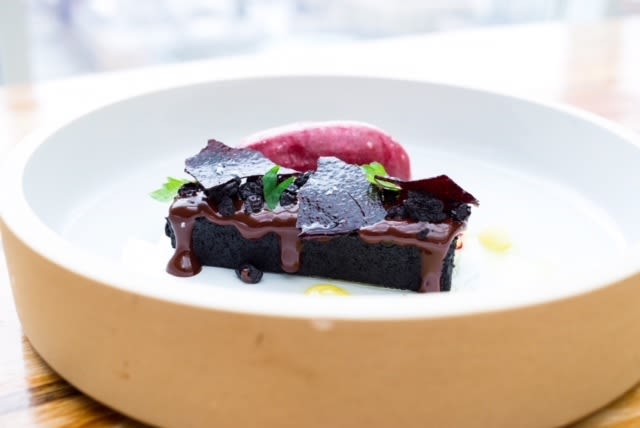Activated Charcoal Bursts with Black Hue. But Is It Healthy?

Departure's flourless Chocolate Ash Cake.
Image: Drew Tyson
Activated charcoal—the food-grade, black-hued powder derived from charred coconut husks or hardwoods—is increasingly popping up in Portland’s food scene. Prasad’s Black Majik smoothie, for instance, boasts of “detoxing” benefits from activated charcoal, which imparts a signature black tinge. The local health-conscious café uses a brand of activated charcoal called Viva Doria, which claims that its product can “treat acne, upset stomach, to whiten teeth and get rid of toxins.”
Meanwhile, here at Portland Monthly, we recently divulged our love for the creative desserts at Departure, where Gregory Gourdet has tapped into the charcoal trend. The chef uses activated charcoal to add a tasty, toasted flavor to three different items: coconut ash pudding, chocolate ash cake, and “Goth Cone” ice cream.
A supplement that looks rad, tastes great, and fixes all of your health problems? Sounds like a win-win, right? Not exactly, especially when activated charcoal is marketed as a detox product, for the charcoal doth detox too much.
According to Zoomcare’s Dr. Alena Guggenheim, activated charcoal “acts like a sponge inside your digestive track, soaking up other substances” like nutrients and even medications. The nutrients of the pineapple and blueberries in that fancy smoothie? Nullified.
This makes sense when you consider that activated charcoal is most commonly used as a medical treatment for certain poisons and overdoses. That’s right—in serious, life-threatening situations, charcoal can be a great tool. But when it comes to hangovers or pesticides or whatever your hot yoga teacher means when they talk about “sweating out toxins,” your liver is typically up to the task. In fact, if you’re adding activated charcoal to healthful smoothies and the like, that charcoal just might rob your body of precious nutrients, plus lessen the effects of any medications you’re taking.
Here’s the bottom line: in small doses, activated charcoal is a neat way to create spooky goth ice cream or add a toasty taste to a dish. But if you’ve been gulping down charcoal lemonade in the hopes of a holiday “detox,” just remember that science isn’t on your side.




